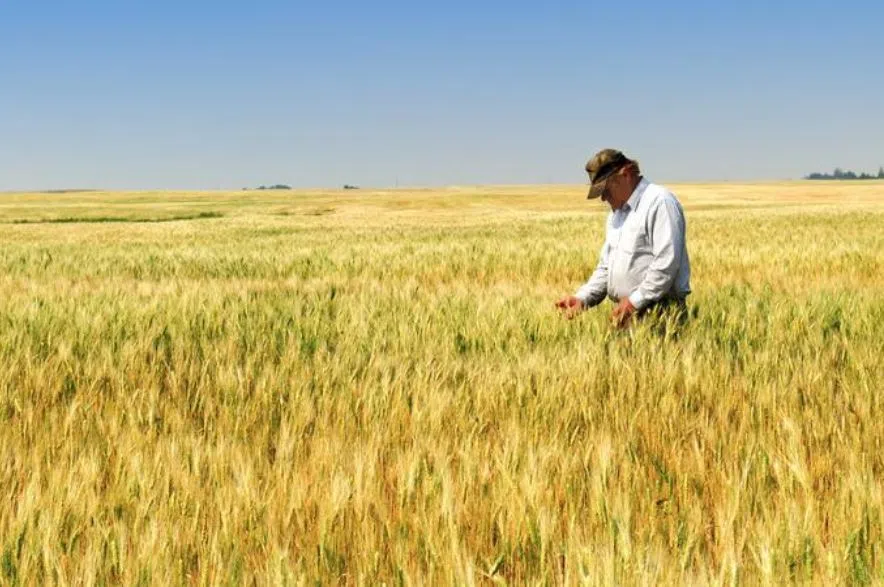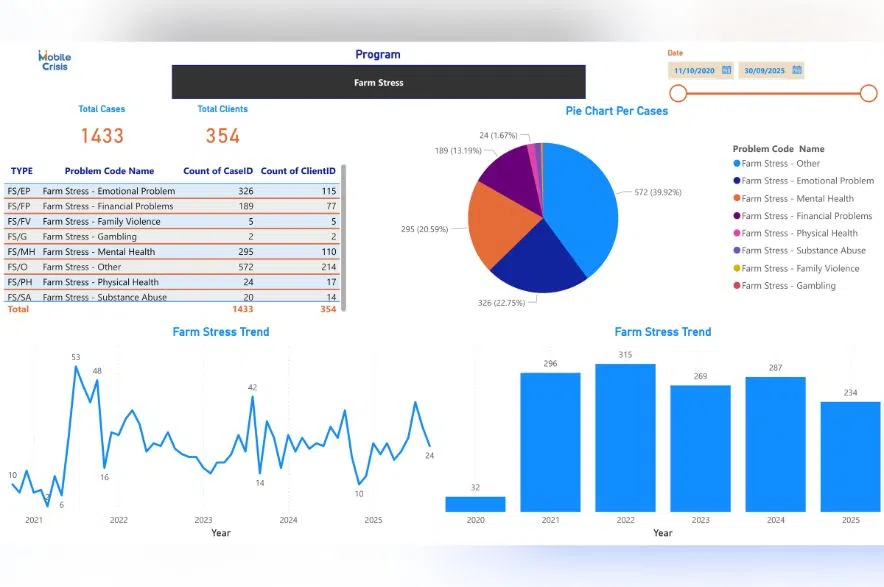Harvest has come and gone for the farmers of Saskatchewan and they can relax a little knowing they are no longer at the mercy of Mother Nature. However, the stress for producers doesn’t end with harvest, especially in the midst of a trade war.
Mobile Crisis Services Inc. is the company contracted by the Government of Saskatchewan to run the Farmer’s Stress Line. They said the stresses of farming can often lead to impacts in other areas of life. Executive Director Dana Wilkins said that the two issues farmers call in with the most are around managing their marriages, and dealing with the isolation of being on a farm.
Read more:
- ‘Adds to the stress’: More machinery fires being reported this harvest
- SaskPower stresses safety on farms during harvest season in Saskatchewan
- Saskatchewan farmers continue to face depressed prices due to canola tariffs
“I think that there’s probably more farmers that are suffering stress than call in. I think they’re just kind of taught from an early age ‘you’re tougher than that, suck it up’ kind of thing. Reaching out for help, I think, is a stigma that’s being sort of attacked and challenged through media and other movements, which is helpful to get them more okay with calling. We do tend to get calls from another family member for the person that’s suffering on behalf of them.”
Wilkins added, “The farming communities are farther apart and larger farms, bigger operations, it seems now. So the problems are more complex and potentially interrelated.”
On average, the Farmer Stress Line receives about 250 calls a year from farmers who are dealing with mental health issues, mostly from the spring into the fall. However, data provided by Wilkins showed that those call numbers have been on a slow but steady decline since 2022.
This year, the Stress Line had seen 234 calls as of Sept. 30, with 157 of those calls (over 67 per cent) coming between the start of April and the end of September, and 40 calls (over 17 per cent) in the month of July alone.
Farmer advocacy groups like Saskatchewan Association of Rural Municipalities (SARM) and the Agricultural Producers Association of Saskatchewan (APAS) have reported significant financial strain on producers in recent months, with full grain bins and limited market access, due to retaliatory tariffs imposed by China. However, Wilkins said calls to the help line that come in aren’t necessarily about those specific topics, but more to due with the personal issues farmers are experiencing as a result of those pressures.
Callers with questions about actual farming operations are referred to the Agriculture Knowledge Centre.
“That’s one of our main referral sources. We also refer them to the mental health and addiction services that are in their home community, or close to their farming operation, so that they don’t have to come into Regina because we monitor the farm stress calls for the entire province out of Regina,” said Wilkins.
“So we have a list of resources that we refer people to and our mobile crisis counselors are degreed social workers who are professional counselors in social work and addictions, mental health issues and things like that. So they can ask the appropriate questions, make the appropriate assessments and then make the appropriate referrals.”
While farmers are the backbone of the economy in Saskatchewan and have the reputation of being tough, problem-solving people, that doesn’t exclude them from having mental health issues. Just like anyone else, Wilkins believes a lot of those issues could be solved by picking up the phone and calling the right person.
“I think that if people are struggling with any kind of stress, relationship problems, mental health, addictions, gambling, or anxiety…things like that, they can call Mobile Crisis Services. They can get on the Farm Stress Line on the website, or mobilecrisis.ca to get all the links to all the services that they could potentially need to use.
They can call and talk to a person who’s a qualified and trained counselor, or they can search some of the services and support themselves before they want to make that call, if that suits them better. But I think the main thing is reaching out, there is support out there for farmers. They don’t have to struggle in silence.”
Reach the Farm Stress Line by calling 1-800-667-4442, or you visit their website.












